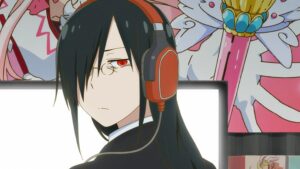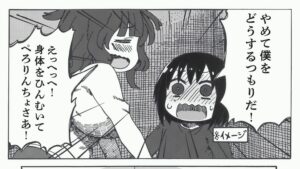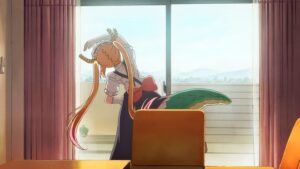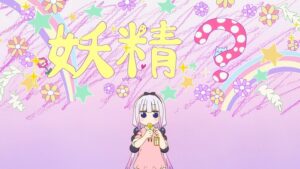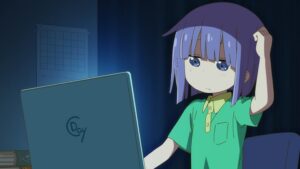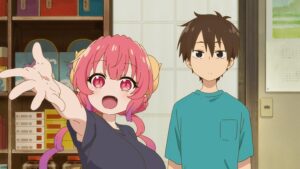Miss Kobayashi’s Dragon Maid has been in hangout comedy mode for several weeks now, paying just as much attention to its supporting players as either of the characters in the title. I love when TV shows spread the wealth between cast members, but not all of Maidragon’s are created equal. I’m all Lucoa’d out, for instance, and the show hasn’t offered a lot of worthwhile societal commentary to offset her recent prominence. It feels like chapters are being adapted hunt-and-peck style, rather than being grouped into episodes by theme (an area where the series has excelled in the past). So, with each miniature story feeling so disjointed, and the show not generating much food for thought as of late, it’s time for a lazy Kaguya-style ranking of the six segments from Maidragon’s past two episodes. Gotta bang this post out somehow, man.
#6: Conversations About Sleep (episode 7.2)
This ended up being my least favorite chapter of this doubleheader despite the presence of Elma, who’s probably my favorite choragon. Occasional reminders of compromises that the dragon characters make in order to live among humans are appreciated, but all this befuddlement about sleeping patterns felt baseless. Even if Tohru doesn’t need to sleep, she has to understand by now that humans exhaust their daily energy supplies as a matter of biology. Kobayashi explained this to her, but then detoured onto some train of thought about conforming to the sleeping patterns of other people. It felt like the show was fabricating a greater meaning for our diurnal lifestyle other than just “circadian rhythm,” and it really didn’t need to. Great lightning during the scene where Tohru woke up from her nap, though – KyoAni’s color and compositing departments are doing some nice work this season.
#5: Fafnir Preps for Comiket (episode 7.1)
I don’t know if you all noticed, but Lucoa has some pretty big breasts. That trait made her a perfect model for Fafnir’s doujinshi about a voluptuous Jezebel, who is repeatedly cursed by a young victim of hers after he reaches a breaking point. Thankfully his storyline wasn’t a duplication of the Shouta/Lucoa pairing, just an exaggeration of its underlying fetish, but there wasn’t much to it apart from that. We had to make do with a severely scaled-back portrayal of Comiket during the segment’s conclusion, but that’s par for the course in modern anime – remember Eizouken’s neutered attempt at depicting the event last year? I did like that Lucoa’s book of cosplay photos outsold Fafnir’s manga about a vile temptress, which could be read as a shot at doujin artists who pervert other people’s characters (but only if you squint).
#4: Shouta Celebrates Father’s Day (episode 8.1)
I don’t know if you all noticed, but Lucoa has some pretty big breasts. She wasn’t integral to this tale of Shouta synthesizing a talisman for his dad, but her boobs were all over it anyway. I don’t mind them in small doses (as if that were even possible), but they do get tiresome after a while. Despite all the fanservice, there was some real potential for that mythical “worthwhile Shouta story” to emerge here. The scene where he presented the fruits of his labor to his dad caught me by surprise: an exterior shot that peered through a window from a distance, representing the emotional gap between father and son. If we’d spent a little more time on Shouta’s obsession with perfecting his gift in order to please a distant parent, this segment could have been a lot more poignant than it ended up being. I guess strained familial relationships don’t sell Blu-rays as effectively as dragon titties, though.
#3: Looking for a Lost Doll’s Owner (episode 8.3)
This was the least impressive Ilulu-centric chapter thus far, but that’s not a particularly severe criticism, as the others have been some of the season’s best material. She’s been through a progression of anger, tolerance, and love where humans are concerned, and we already hit the deep-seated regret she holds about her aborted childhood friendships somewhere in there. Using an abandoned doll as a one-to-one symbol for the doll that a human friend once gave her struck me as too blunt a means of calling back to that grief. I’d have liked to see Ilulu solve a problem for a regular customer at the candy store (her new place of employment), rather than return a lost item to a faceless patron with almost no connection to the place. We did get a new angle on the whole doll thing, since its owner bowed to societal pressure in leaving it behind (just as Ilulu’s severance of her childhood friendships was dictated by her clan), but the world of difference between their circumstances made that parallel a difficult sell.
#2: Kobayashi Calls Out Sick (episode 8.2)
Has Maidragon never indulged in the “nursing a sick character back to health” trope before? It’s been so long since the first season that I can’t remember, but even if this was our second time around that particular rosebush, it was an enjoyable trip. Virtually every expression of Tohru’s crush on Kobayashi this year has been comedic in nature, so it’s kind of a bummer that it took Kobayashi falling ill to showcase a more sensitive side of their relationship, but I’ll take what little seriousness I can get from the Nichijou director. Tohru’s old age was put to good use here, as her knowledge of human frailty was contrasted with her unpreparedness to personally care for a sick human. Memories of centuries-old plagues, rice gruel made with noncomplimentary ingredients, trips to her home world to find medicine for Kobayashi’s illness – all of her thoughts and behaviors in this episode stemmed from her unique perspective, making for some of the best Tohru material of the year so far.
#1: Kanna’s Ghost Hunt (episode 7.3)
Sometimes the people at KyoAni get their hands on a simple premise and spin it into anime gold. This was one of those instances. “A group of kids roam their school in search of ghosts” is a lightweight concept, so a lot of creative teams would zero in on the “ghosts” portion and try to spice things up with gags, misdirection, or parody of the horror genre. The Maidragon crew headed in the opposite direction by giving all their attention to the “group of kids,” who got sidetracked and turned their mission into a string of games and challenges. And the best of those games was (as you already know if you’ve watched the episode) the makeshift soccer match with a child’s shoe as the ball. The scene was wonderfully animated and soundtracked, with a childlike piano/recorder melody belying Kanna’s unearthly proficiency at the sport. Their game landed them in trouble with some older kids, and escaping the reach of their fists set off an entirely new round of exploration – the way one excursion led into another in this segment created a freeform sense of fun that I really enjoyed.

